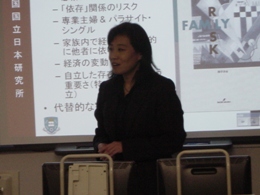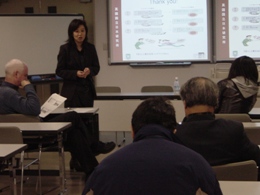|
|
講師:武田宏子氏 (シェフィールド大学東アジア研究学部講師)
演題:The Governing of Family Risks in Contemporary Japan
日時: 平成21年11月30日(月)16:10~18:00
会場: 第二校舎棟 545共同研究室
司会: ロバート・アスピノール教授 (本学経済学部)

|

|
【講演概要】
Dr. Hiroko Takeda introduced this talk by discussing the ongoing structural changes in families represented by the demographic shift and changing lifestyles, and the impact of family policy on the reform agenda of industrially advanced countries. She said that the Japanese state is no exception to this trend. The ‘structural reform of family life’ was proposed by the 2002 White Paper on the Quality of Life (Kokumin Seikatsu Hakusho) whose preface was written by Takenaka Henazo, the then Minister in charge of economic reform. His proposal was underpinned by an understanding that, echoing Ulrich Beck’s thesis of Risk Society, the family in Japan, which had once functioned as a provider of safety net for individuals, now has become a source of risk. This was reflected in popular culture by, for example, the popularity of Japanese horror films which portrayed the family as a source of danger. Around the same time, a new model of the Japanese family was presented in several government documents with reference to this new understanding of the family, urging a departure from the male-breadwinner-female-care-giver nuclear family model on which postwar economic and social policies were based.
Dr Takeda discussed these changes in family policy in the 2000s when the so-called ‘structural reform policy’ based on neoliberal principles was implemented by the national government. The recalibration of family policy is a common challenge found across the other industrially advanced countries in which issues relating to the ‘logic of risk distribution’ are growing in importance as a political issue and the conventional framework of the welfare state system is challenged by ‘new social risks’. Dr Takeda argued that a detailed examination of the Japanese case of family policy reform in the 2000s with reference to the notion of risk enables us to have a clearer understanding of family policy and families in contemporary Japan through comparative studies, while providing some theoretical insights for the studies of risk, gender, the family, family policy and neoliberalism. (by Robert Aspinall)
【講師紹介】
シェフィールド大学東アジア研究学部講師・PH.D.(英国シェフィールド大学)
政治社会学の視点からのジェンダー研究、日本及び東アジアにおける政治経済学、社会理論、家族理論とガバナンス、政治的言説の分析、女性の政治参画等を研究。
著書にThe Political Economy of Reproduction in Japan: Between Nation-State and Everyday Life (RoutledgeCurzon, 2005.) の他、'The Political Economy of Familial Relations: The Japanese State and Families in a Changing Political Economy'(the Asian Journal of Political Science 2008), 'Gendering the Japanese Political System: the Gender-Specific Pattern of Political Activity and Women's Political Participation'(Japanese Studies 2006)など多数の論文がある。
滋賀大学経済学部リスク研究センター TEL:0749-27-1404 FAX:0749-27-1189
E-mail: までお願いします。
